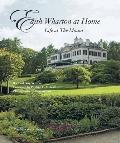The introduction mentioned Richard Guy Wilson's new book, which I think will be of interest not only to those who appreciate architecture. Its focus is on The Mount (now a historic house museum) and Edith Wharton's life there. Because the publication of Edith Wharton at Home is timed to coincide with Wharton's 150th birthday, I first suspected that the book might be a commissioned anniversary publication, but now that I've learned that Monacelli Press is associated with Random House that doesn't seem likely. But, even if it Edith Wharton at Home was a commissioned anniversary publication, the caliber of its author and subject practically ensures a quality product.
Edith Wharton at Home: Life at the Mount by Richard Guy Wilson
(forthcoming September 2012)
 Completed in 1902, The Mount sits in the rolling landscape of the Berkshire Hills, with views overlooking Laurel Lake and all the way out to the mountains. At the turn of the century, Lenox and Stockbridge were thriving summer resort communities, home to Vanderbilts, Sloanes, and other leading families of the Gilded Age. Edith Wharton at Home connects The Mount to that milieu and details Wharton's design of the house and landscape. Embodying principles set forth in Wharton's famous book The Decorating of Houses and her deep knowledge of Italian gardens, The Mount is truly an autobiographical house. There Wharton wrote some of her best-known and successful novels including Ethan Frome and House of Mirth.
Completed in 1902, The Mount sits in the rolling landscape of the Berkshire Hills, with views overlooking Laurel Lake and all the way out to the mountains. At the turn of the century, Lenox and Stockbridge were thriving summer resort communities, home to Vanderbilts, Sloanes, and other leading families of the Gilded Age. Edith Wharton at Home connects The Mount to that milieu and details Wharton's design of the house and landscape. Embodying principles set forth in Wharton's famous book The Decorating of Houses and her deep knowledge of Italian gardens, The Mount is truly an autobiographical house. There Wharton wrote some of her best-known and successful novels including Ethan Frome and House of Mirth.
Published to coincide with the celebrations surrounding the 150th anniversary of Wharton's birth, Edith Wharton at Home presents Wharton as a writer, as a designer, and as a hostess. Authoritative text by Richard Guy Wilson, Commonwealth Professor of Architectural History at the University of Virginia and host of the popular series America's Castles is illustrated with archival images as well as new color photography of the restoration of The Mount and its spectacular gardens.



